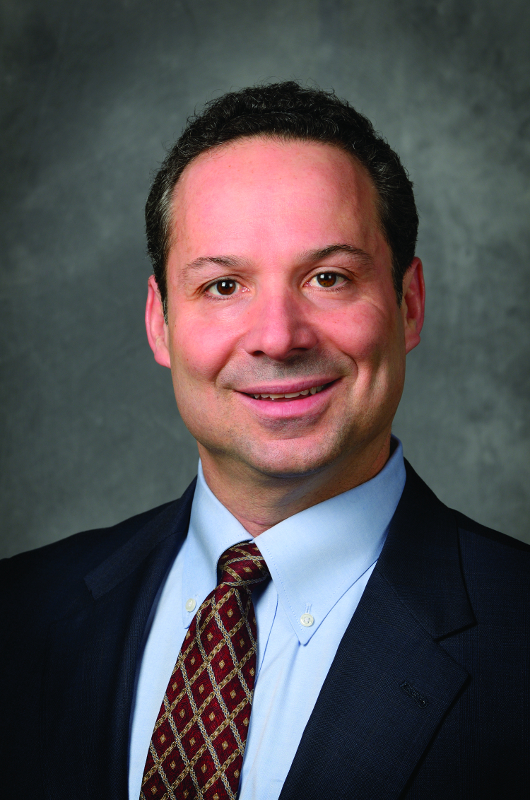In 1982, Chuck Weis took his first steps inside the financial department of Sinai Health System, a safety-net provider on the South Side of Chicago. He was Sinai's assistant controller at the time, but his public accounting background helped him ascend into the CFO role only four years later.
Mr. Weis has led Sinai's fiscal strategy as CFO since then, a tenure he is proud of thus far. To paint a quick picture, 60 percent of Sinai's patients have Medicaid, and another 13 percent have no insurance whatsoever. That type of payer mix generally sends gasps throughout a room, he says, but he has remained with the organization because its safety-net mission is "woven into the fabric" of everyone there, from the board on down.
 Mr. Weis says the top executives he has worked for also place great trust him. "What I've always said working at Sinai: My role has really been to be the financial right hand to Sinai's three CEOs over the course of those 31 years," Mr. Weis says. "Ruth Rothstein, Ben Greenspan and now Alan Channing — all have different management styles, but all have the mission of Sinai in their foundation. And they really looked at me for financial acumen and relied on me."
Mr. Weis says the top executives he has worked for also place great trust him. "What I've always said working at Sinai: My role has really been to be the financial right hand to Sinai's three CEOs over the course of those 31 years," Mr. Weis says. "Ruth Rothstein, Ben Greenspan and now Alan Channing — all have different management styles, but all have the mission of Sinai in their foundation. And they really looked at me for financial acumen and relied on me."
Often in the healthcare space, the big-picture management issues fall onto the CEO's plate. And it makes sense. The CEO is the face of the organization and is viewed as the standard of how others should perform or behave within the organization.
Today, as hospitals and health systems work through shifting reimbursement models and growing calls for increased transparency and clinical quality, the CEO simply doesn't have the room to take on every big-picture management issue. More than ever, the hospital C-suite has to become a high-functioning collaboration, and the CFO plays a crucial role.
Today's financial leadership
Earlier this year, Fred Savelsbergh, CFO of Dallas-based Baylor Scott & White Health, told Becker's Hospital Review there are several ways healthcare finance leaders can improve their leadership skills: CFOs should consider building relationships with mentors, working with an executive coach, empowering the financial department through positive reinforcement, establishing an ethical culture with clearly defined behaviors, understand team members on a personal level and set individual goals.
 Those objectives resonate with John Orsini, CFO of Cadence Health, a two-hospital system based in Winfield, Ill. But he adds financial leadership would be stuck in neutral if they didn't wrap those elements with a commitment to serving patients. It's an area often reserved for a hospital's mission statement and the CEO, but the CFO has to display a similar level of passion. "I strongly believe finance, first and foremost, is a service organization," Mr. Orsini says. "We need to make sure we understand operations and the business model, and provide timely, accurate and actionable information so we can run the organization well from a financial, quality and patient satisfaction perspective."
Those objectives resonate with John Orsini, CFO of Cadence Health, a two-hospital system based in Winfield, Ill. But he adds financial leadership would be stuck in neutral if they didn't wrap those elements with a commitment to serving patients. It's an area often reserved for a hospital's mission statement and the CEO, but the CFO has to display a similar level of passion. "I strongly believe finance, first and foremost, is a service organization," Mr. Orsini says. "We need to make sure we understand operations and the business model, and provide timely, accurate and actionable information so we can run the organization well from a financial, quality and patient satisfaction perspective."
Undoubtedly, serving the community today involves transparency. Nonprofit hospitals and health systems file Form 990s every year, but those documents only go so far. Steven Brill's TIME article from this past February put the public over the edge, creating a demand to know how the price of healthcare can vary so wildly. The call for transparency is completely understandable, Mr. Orsini says, and CFOs are the perfect ambassadors to help explain their respective situations.
"Being transparent and giving people the truth and what it means — you want to create information that provides the context for what the health system is thinking about," Mr. Orsini says. "It's easy when you have a burning platform to effect change. But you have to really make sure folks understand everything, and you have to connect the dots.
"It's about [giving] enough information so people have context for decisions," Mr. Orsini adds. "You're failing if people start to say, 'Why are you doing this?'"
Bringing together the financial and clinical house
Pamela Vukovich, director and senior CFO consultant with Warbird Consulting Partners and former CFO of Legacy Health in Portland, Ore., understands financial leaders have a surplus of issues to cover today. Rapid consolidation and weakening medians are only intensifying the pressure, she says.
In the end, all hospitals have to solve the same problem: How can we improve the patient experience and health of our population while reducing the per capita cost of healthcare? Everything ultimately originates on the clinical side, where care is delivered, Ms. Vukovich says, and CFOs have to make strong-willed efforts to collaborate with physicians, nurses and all other providers.
"CFOs have to become partners with the clinical side," Ms. Vukovich says. "Not all CFOs are comfortable doing that, but they have to get comfortable and speak the same language as clinical folks to see where the organization is clinically. CFOs are not known for their communication skills, but they have to learn how to step outside that box."
 The delicate balance
The delicate balance
A repeated line for healthcare leaders, especially as reimbursement dwindles, is "no margin, no mission." Nonprofits are often criticized for watching their bottom lines, but the line speaks a truth. Hospitals, no matter their tax status, have to make a profit to reinvest in their operations and stay viable for their communities.
CFOs cannot be overly absorbed with the bottom line either, Mr. Weis of Sinai says. His health system has been able to survive healthcare reform thus far because of his and his colleagues' passion for Sinai's mission — not by following a balance sheet alone.
"You have to understand it's a balance of the business side with the mission and community," Mr. Weis says.
More Articles on Hospital and Health System Leadership:
Staying Strong Under Pressure: Nonprofit Hospitals Discuss the Challenges and Opportunities of 2014
6 Traits That Define a Great Hospital CFO
Philosophies on Mergers and Finances: Q&A With Beaumont Health System CFO Nick Vitale

